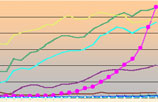Inquiry into the health of citizens
By Huang Xiangyang (China Daily) Updated: 2012-05-24 08:12
You never know what you have until it's gone. This is especially true of your health.
Until recently I had always thought I was a physically sound person and I never worried about my health. Like most people, I do catch a cold or have a sore throat occasionally, but for the past 10 years, I have rarely, if ever, gone to see a doctor.
Thus I had seldom exercised any caution in my pursuit of palatable pleasures. It was a case of "eat, drink and be merry". I would regularly visit McDonald's for a Big Mac and Strawberry Milkshake and I preferred to quench my thirst with Coke or any other carbonated soft drink instead of water. I was a big fan of Dreyer's ice cream and Ferrero Rocher chocolate, and loved spicy food. Even after finishing work at midnight, I would usually not call it a day without a feast of beer and skewers of mutton with my colleagues at a 24-hour restaurant.
This, despite the fact I had received warnings about my physical condition. My annual physical checkup reports had long suggested I had a fatty liver, in addition to ocular, dental and cervical vertebra problems. But I persisted in my ways with the belief that with the fast tempo of life today, most people have some kind of health problem. As for my fatty liver, I knew it was reversible. I was moved by a story about a "heroic mother" in Hubei province who cleaned up her liver - by walking 10 kilometers a day for six months - so she could donate her liver to save the life of her ill son. With this in mind, I thought I too could "walk it off" if I had to.
And that time seemed to have come.
Two weeks ago, a growing sense of discomfort in the upper-right side of my abdomen forced me to go to hospital. After hours and hours of waiting and rounds of blood, ultrasonic and glucose tolerance tests, I was presented with a verdict that basically declared an end to my years of willfully abusing my body with an unhealthy diet, as my fatty liver has deteriorated to such an extent it requires immediate medical intervention. Even worse, I am well on my way to diabetes and hypertension.
It's time to face the music.
But now that I have to swallow five different pills and capsules everyday, I have developed a much keener appreciation of life, which I had taken for granted previously. Death is no longer unimaginable and the days do not stretch out endlessly ahead. Now I appreciate why we should live each day as if we will die tomorrow.
My story may sound similar to those of millions of others who are also paying the price for their negligence or bad habits. Only when I was drowning in a sea of illness at hospital did I realize how unhealthy and vulnerable we are.
Our nation is so different from the China we read about.
We are familiar with the country's economic miracles, its pride in being the world's second-largest economy and biggest exporter, its insatiable appetite for nearly everything from coal to steel to cement, and its gold medals at the Olympic Games. But China is also superpower for diseases such as diabetes, hypertension and various cancers. It is home to 92 million diabetes patients with a 150-million reserve force of which I am now a member and 200 million known sufferers of high blood pressure.
Of the 7 million people who die of cancer each year worldwide, a quarter of them are from China. Its mortality rate for strokes is four to six times higher than Japan and the United States. This stark reality has prompted the World Bank to issue a warning that "a reduced ratio of healthy workers to sicker, older dependents will certainly increase the odds of a future economic slowdown and pose a significant social challenge". The time when China was called "the sick man of East Asia" has long gone. But there is still long way to go before it builds itself into a real "strongman" in the world.
After all, the health of a nation is not measured by the number of Olympic gold medals it can win, but by the physical well-being of each of its citizens.
The author is a writer with China Daily. E-mail: huangxiangyang@chinadaily.com.cn
(China Daily 05/24/2012 page8)











